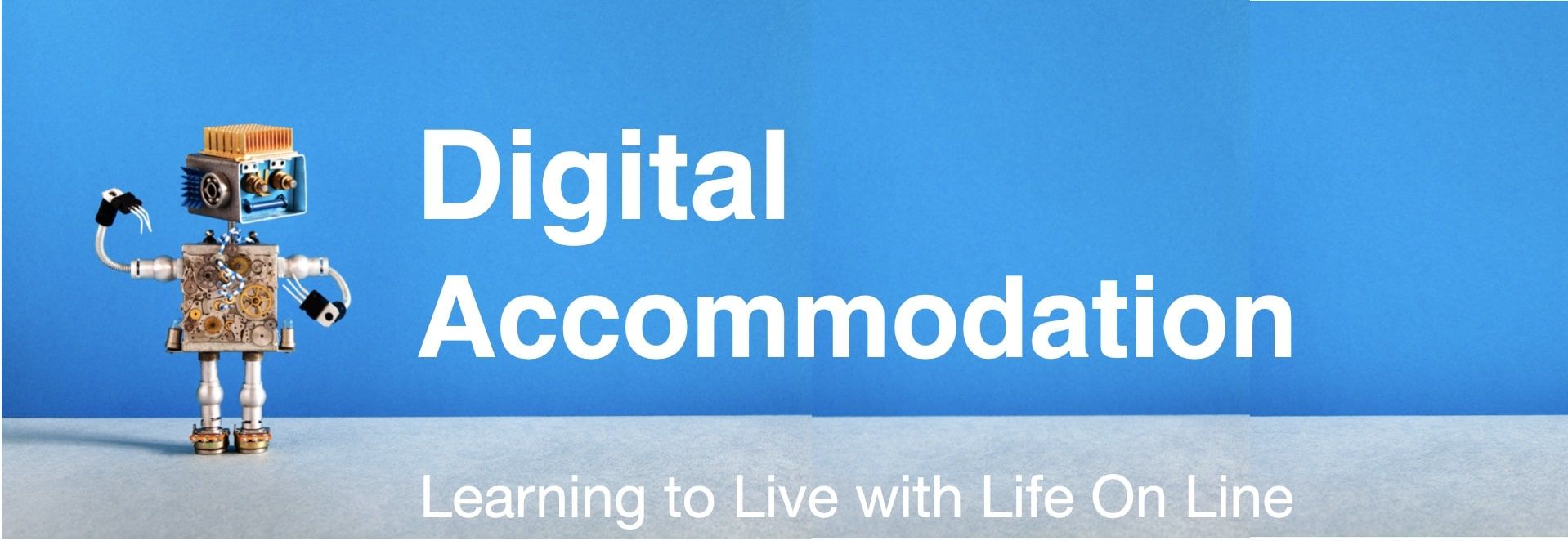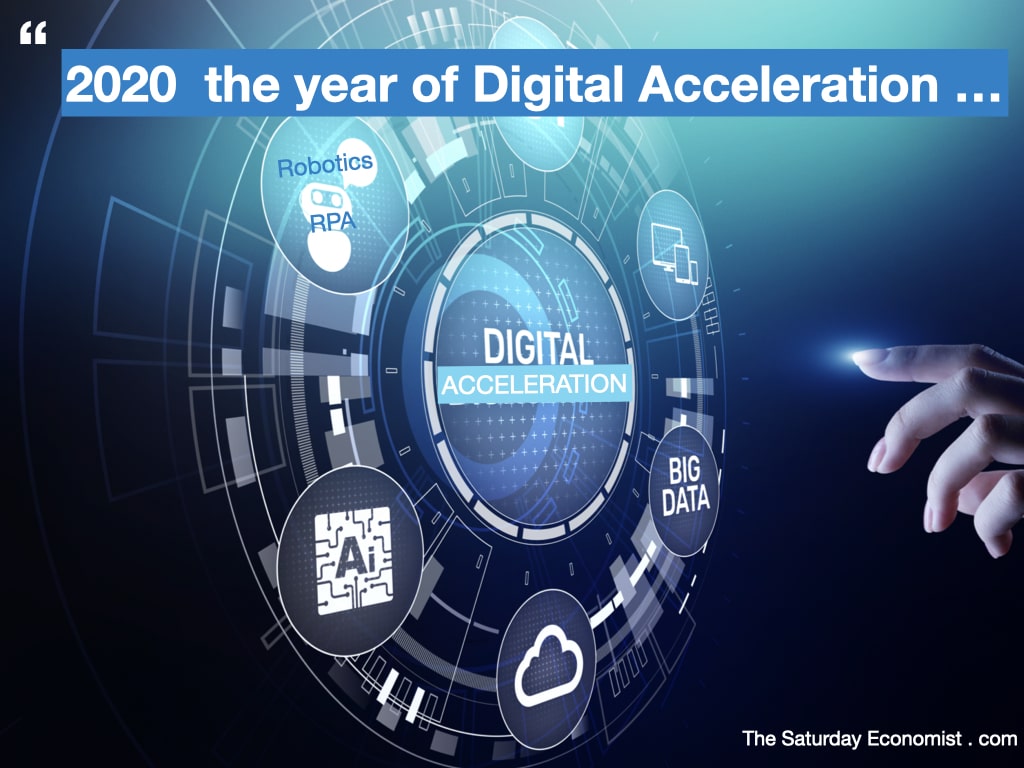|
If 2019 was the year of digital disruption, 2020 was the year of digital acceleration. Satya Nadella CEO of Microsoft would say, "we have seen two years of digitalisation in two months". Some would recall the words of Lenin ... "There are decades when nothing happens, then weeks when decades happen."
The Covid pandemic resulted in the lock down of large parts of the economy. Businesses were forced to close offices and operate remotely with employees working from home. Sectors hit badly in the process were accommodation, food, travel, tourism, leisure, entertainment, pubs, restaurants and high street retail. Online and into the cloud became the mantra for all businesses. Communication systems flourished. Zoom became the hot "verb" for on line communications. Microsoft teams, GoToWebinar and Cisco Webex joined the fray. Businesses were forced to centralize communication networks and data storage. Microsoft 365 had set the standard for online data exchange, storage and communications. Microsoft Teams offered chat, calls and video. "A platform in which anyone can engage at any time, bringing everyone closer. Docs, photos, videos, chat history, and meeting notes are always online, so it’s easier to work together." Google offered Workspace, Facebook developed Workplace. Slack enabled collaboration among team members with features including direct messaging, private groups, and channels organized by topic. Instant messaging services included WhatsApp, WeChat, Telegram, Signal, Skype, Viber and Discord. Data exchange platforms included Box and Dropbox. CRM systems had to be upgraded and integrated. All Smart businesses were experimenting with "Agile" and "Scrum" software. Moving online and into the cloud would accelerate the process of centralized communication. Investment in systems and hardware became a priority. Not all members of staff would have the right equipment and space available to work from home. Focus on family and home led to a change in lifestyles and for some, a reassessment of work life balance. Online shopping accelerated. Amazon was setting the standards for UX and UJ by which all other would be judged. One-click and Amazon Prime set the pace for next day delivery. In the UK in January 2020, 19% of sales were made online. Online food sales were limited to just 5% of total sales. In March 2021, online sales accounted for 35% of all transactions. The proportion of food sales online had more than doubled to almost 12%. The damage to traditional retail was intense. Shops closed at a record rate in the first half of the year. Online giants went on a shopping spree. Boohoo picked up Debenhams, Dorothy Perkins, Burtons, Karen Millen, Warehouse, Wallis and Oasis. Asos placed Topshop, Topman and Miss Selfridge in the Basket. Cinemas struggled as home entertainment surged. Streaming and subscription services were the beneficiaries. Netflix was valued at $250 billion dollars at the start of 2021 almost doubling in value compared to pre pandemic levels. Disney Plus is considered to be the top Netflix competitor. It offers the widest variety of content ranging from animated masterpieces, documentaries, the Star Wars, Marvel cinematic franchises, and the Disney Channel’s expansive library of movies that go back to the 1950s. Disney’s acquisition of Fox in 2019 has expanded its back catalog of content to include popular shows like The Simpsons. Amazon demonstrated the concept "Content is Key" paying $8.5 billion dollars to acquire MGM. The company is investing heavily in growing its position in the entertainment world. MGM is the home of James Bond. It is one of the most iconic movie studios in Hollywood. The deal gives Amazon an extensive library of film and TV shows to fill out its Prime Video content streams. MGM has a catalog with more than 4,000 films and 17,000 TV shows. Home entertainment became important but so did home food sales and delivery. Deliveroo, Just Eat, Uber Eats, Delivery Hero, Grub Hub raised $billions in the race to satisfy the appetite for takeaway food. Ocado, Getir and others would seek to meet the appetite for grocery delivery. 2020 was the year of acceleration in digital payment. Jamie Dimon of JP Morgan would say "cash is trash". It was a reference to the meagre returns on cash investment. In 2019 cash accounted for almost 30% of total transactions. By the end of 2021, just 10% of transactions are cash based. The proportion will fall to less than 5% within two years. Visa, Mastercard, Paypal, Stripe and Square will continue to reap the harvest of a lower cash yield. Online logistics and storage were the beneficiaries in the property market as retail fortunes plummeted and doubts were cast over the future of commercial property. Working from home in 2020, would appear to have ended the prospects of a return to a five day office week. 2020 was the year of digital acceleration. Online and into the cloud for businesses. Work from home, eat at home and be entertained at home for employees and families. Workers may be reluctant to return to the old model of workplace. Businesses will be unable to return to the old model of work. Digital Accommodation is our series for 2021, learning to live with life on line. #DigitalDisruption #DigitalAcceleration #DigitalAccommodation #DimensionsofStrategy #TheSaturdayEconomist #JohnAshcroft
0 Comments
Leave a Reply. |
John Ashcroft
Masters of Strategy on Archives
May 2023
Categories |
- Home
- Artificial Intelligence
- Digital Disruption
- Digital Accommodation
- The Master Class
- The Case Studies
- Empires of the Cloud
- Letters to a Friend on Social Media ...
- The Tool Box
- Five Dimensions
- CRIMSON Clouds
- Market Mapping
- CBS News
- PESTEL framework
- Kaizen and KSFs
- Business Modelling
- 7 Ss Framework
- Crisis Management
- Secrets of a great presentation
- Business Planning
- Fishing in a Pond?
- About
- The Apple Case Study
- The Lego Case Study
- The Yahoo Case Study
- The Twitter Case Study


 RSS Feed
RSS Feed
